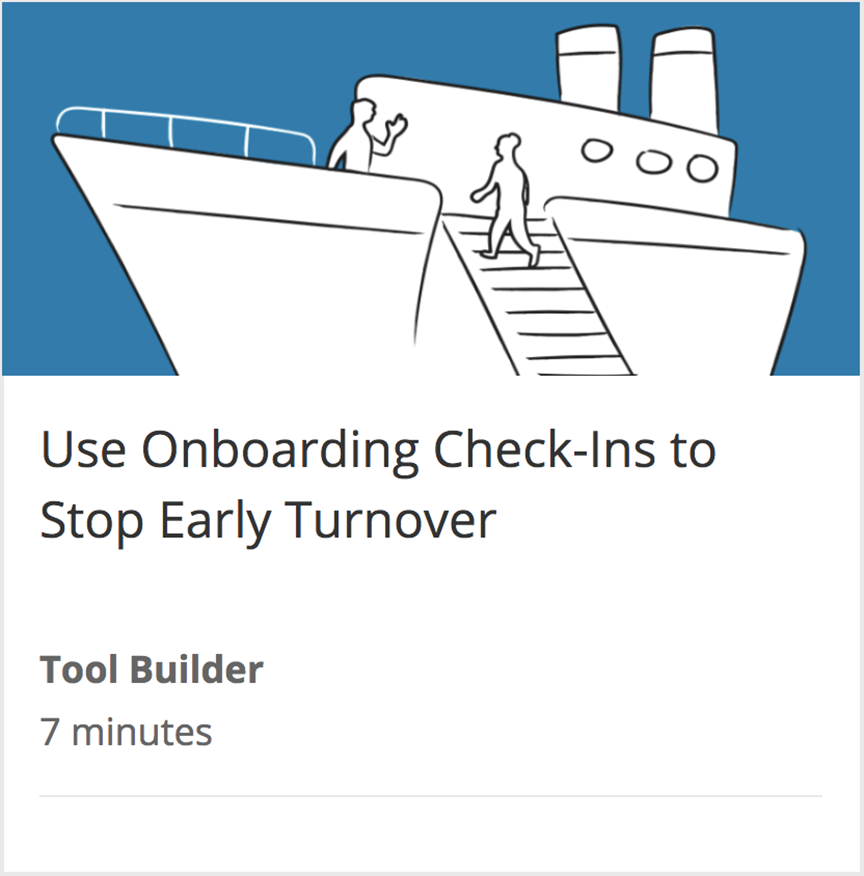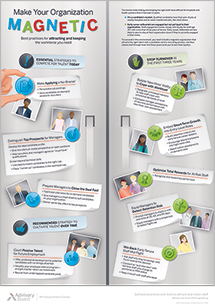Auto logout in seconds.
Continue LogoutRead Advisory Board's take on this story.
Editor's note: This popular story from the Daily Briefing's archives was republished on Sept. 26, 2018.
Some of your underperforming "C players" simply need to be managed out of your team—but others can be converted into "B" or even "A" performers, Jay Conger and Allan Church write for the Harvard Business Review. Here's how to tell the difference.
Ready to have a stay interview? Download our list of questions to pick from.
The three types of 'C players'—and why you need to address them
According to Conger, a research professor of leadership studies at Claremont McKenna College, and Church, the SVP of global talent assessment and development at PepsiCo, underperformers—or "C players"—are employees who consistently accomplish only 40% to 50% of what was requested.
Though it may be easy to focus your attention on your top performers, "you'd be remiss to neglect" these employees who fall short of expectations, Conger and Church write, as you must mitigate the damage they do to other staff members and protect your own reputation as a leader.
C players typically fall into one of three categories, according to Conger and Church:
- Those who have been promoted beyond their competence;
- Those who are competent but unmotivated; and
- Those who are competent and motivated, but lack people skills.
How to handle the three types of C performers
To determine the right approach to managing a C player, you have to figure out the reason for their underperformance, Conger and Church write.
1. Assess and address competence.
According to Conger and Church, you can assess competence by giving your low performers a challenging assignment with "short-term, concrete, and measurable outcomes," along with all the resources they need to reach the goal. If they fail despite that support and guidance, "you'll have a clear indicator that it was their competence that was lacking, not your guidance"—and if they appear to be defensive about their lackluster results, then "you'll know you have an individual who is not open to learning," the authors write. "They most likely need to be managed out."
2. Assess and address motivation.
To address C players who might lack motivation, Conger and Church recommend you simply ask what they find motivating (or demotivating). Then, closely watch how they "tackle the learning demands of assignments that push them beyond their experience or competence."
Do they demonstrate dedication, initiative, and attentiveness? Then you know you have a motivated employee who will be open to coaching. But if they don't engage, Conger and Church write, then you'll have to dig deeper to find out why they aren't motivated.
According to Conger and Church, employees could be unmotivated for several reasons: Perhaps there's a mismatch between their skillset and their responsibilities—in which case reconfiguring their role to better reflect their strengths will likely "reenergize them." Or perhaps they aren't motivated because of you, their manager: "If your employee senses a mismatch with your style, or thinks you simply aren't invested in them, they will certainly struggle to perform," Conger and Church write. But "working closely and developmentally with your C player may actually benefit both of you."
3. Assess and address people skills.
Finally, to determine if your C player might be an otherwise outstanding performer who lacks the necessary people skills, Conger and Church recommend you ask their colleagues for feedback.
This is more easily said than done, the authors caution: Coworkers may be initially reluctant to speak negatively about a peer or supervisor, so it's important to pay attention to off-the-cuff remarks that suggest there are intrapersonal problems. For instance, a colleague might remark about how the individual never joined meetings about a project, but then showed up for the final presentation.
If this sounds like one of your C players, Conger and Church recommend giving them "very actionable, clear feedback" on their people skills. Make them aware of the negative consequences their behavior, and be candid about the potential consequences to their career if they don't change.
Act early—and act quickly
Ultimately, "our best advice to you: Focus on your C players early on. Find out whether the issue is one of competence, motivation, or people skills (or all of the above)," Conger and Church write. "Give them ongoing coaching and an opportunity to reverse their course within a reasonable time frame. To the extent that you are part of the problem, correct your own actions with them."
But "if they still don't deliver over a specific time frame, let them go," the authors add. While firing someone is an unpleasant task, it's a necessary skill that every manager must master, they explain, and simply passing on a "poor performer to another manager will seriously damage your reputation as [a] leader" (Conger/Church, Harvard Business Review, 2/1).
Advisory Board's take

Sarah Evans, Talent Development
When a team member is underperforming, early intervention is critical. Yet many managers don't know how to go about having a corrective conversation, so they put it off for far too long—or avoid having one altogether. The net effect: Studies suggest that we are more likely to complain about underperformance to our colleagues than to actually discuss issues with the person involved.
On the Talent Development team, we've found that the best way to go into these conversations confidently—and to ensure they actually happen—is to prepare and practice talking points in advance. Specifically, there are four types of talking points that go into an effective corrective conversation:
- A brief description or example of the person's behavior that is contributing to underperformance;
- The expectation that the team member isn't currently achieving;
- A reminder of the consequences of continued underperformance and why it matters, especially as it relates to the person's team or patient care; and
- A few potential responses to keep in your back pocket to help you diffuse any pushback that the team member might give you.
These talking points are quick to draft, easy to practice, and can help you stay in the driver's seat while delivering difficult feedback. And most importantly, they can prepare you to confront underperformance as soon as you spot it, which both demonstrates that you're committed to the under-performing team member and reassures top performers that everyone is held to the same standard. In fact, Advisory Board's engagement survey data show that a leader's willingness to deliver difficult messages is a top engagement driver for medical staff.
Learn more: 7 conversations managers must have with employees
For the past seven weeks, the Daily Briefing has dived deep into the most important conversations managers should have with employees. Now, read the full series—and download tools, templates, and best practices to help you have these critical conversations:
Don't miss out on the latest Advisory Board insights
Create your free account to access 1 resource, including the latest research and webinars.
Want access without creating an account?
You have 1 free members-only resource remaining this month.
1 free members-only resources remaining
1 free members-only resources remaining
You've reached your limit of free insights
Become a member to access all of Advisory Board's resources, events, and experts
Never miss out on the latest innovative health care content tailored to you.
Benefits include:
You've reached your limit of free insights
Become a member to access all of Advisory Board's resources, events, and experts
Never miss out on the latest innovative health care content tailored to you.
Benefits include:
This content is available through your Curated Research partnership with Advisory Board. Click on ‘view this resource’ to read the full piece
Email ask@advisory.com to learn more
Click on ‘Become a Member’ to learn about the benefits of a Full-Access partnership with Advisory Board
Never miss out on the latest innovative health care content tailored to you.
Benefits Include:
This is for members only. Learn more.
Click on ‘Become a Member’ to learn about the benefits of a Full-Access partnership with Advisory Board
Never miss out on the latest innovative health care content tailored to you.


